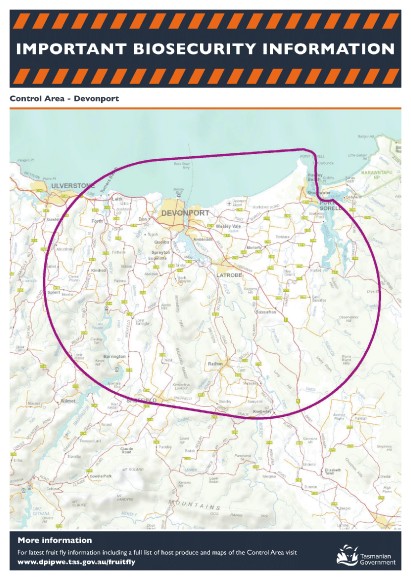Fruit fly larvae have been detected on Tasmania’s mainland within the Spreyton control zone. The larvae were found at a kitchen garden adjacent to a commercial orchard in the greater Devonport area, according to Biosecurity Tasmania.
A suspected adult male Queensland fruit fly (sometimes called Qfly) has also been trapped outside the previously stipulated Spreyton control zone on Tasmania’s mainland.
The zone has now been extended to include Port Sorrel and some surrounding area, after an adult fly was found near Georgetown, more than 30km outside the control zone.

After the January outbreak in the southern Australian state, two control zones have been established to eradicate the pest. One zone is located on the Furneaux group of islands, just off Tasmania’s north coast; the other on Tasmania’s mainland surrounding the Spreyton area (known as the Spreyton control zone).
ABC News said that the discovery has been “downplayed by Tasmanian authorities” after Biosecurity Tasmania’s general manager Lloyd Klumpp claimed the fly could have been blown to that area by the wind.
In a media release from Biosecurity Tasmania, Klumpp said that, “the information at this stage indicates we have a number of hot spot sites rather than a spreading population.”
He added that their priority is to re-establish fruit fly freedom for the state of Tasmania.
Fumigation has been taking place across the control zones, and since the initial incursion in January, 430 properties are being sprayed weekly within 1.5km of the detection areas.
Yesterday, The Examiner reported that fumigation had been suspended in the Devonport area after two Department of Primary Industries, Parks, Water and Environment (DPIPWE) staff reported feeling unwell, after an incident while working with methyl bromide.
A spokesperson from the DPIPWE said that fumigation services have been voluntarily suspended until further notice while the matter is being investigated.
Tighter restrictions on movement within control zones have been implemented including one-way disposal bins, increased signage, and manned checkpoints at main roads surrounding the Spreyton control zone.
At the time of writing, fruit was being traded as usual outside the zones, and fruit within the control zones must comply with market-stipulated fumigation processes. Taiwan is not currently accepting any fruit from within the control zones.
A $2m support package has been set up by the Australian Government to assist growers in complying with eradication procedures.



